Biology:Ravenea
| Ravenea | |
|---|---|
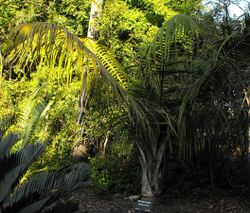
| |
| Ravenea rivularis | |
| Scientific classification | |
| Kingdom: | Plantae |
| Clade: | Tracheophytes |
| Clade: | Angiosperms |
| Clade: | Monocots |
| Clade: | Commelinids |
| Order: | Arecales |
| Family: | Arecaceae |
| Subfamily: | Ceroxyloideae |
| Tribe: | Ceroxyleae |
| Genus: | Ravenea C.D.Bouché |
| Synonyms[1] | |
| |
Ravenea is a genus of 20 known species of palms, all native to Madagascar and the Comoros.[1][2]
They are small to large, dioecious palms, with solitary, robust grey stems, swollen at base and gradually tapering upward. The species vary greatly in size, with R. hildebrandtii and R. nana only reaching 4 m, while R. robustior and R. sambiranensis both reach 30 m. The leaves are up to 2–5 m long, pinnately compound, reduplicate, erect at first then arching, twisted near the apex; with numerous crowded narrow ribbed leaflets. The inflorescence is short, borne among the leaves; the fruit is a red drupe.[3] One particular species, Ravenea rivularis, is commonly cultivated as a houseplant and grown indoors all over the world. However, it is actually considered a vulnerable species in its wild habitat with fewer than 900 trees growing naturally.
Species
| Image | Scientific name | Conservation Status | Distribution |
|---|---|---|---|
 |
Ravenea albicans (Jum.) Beentje | Endangered | northeast Madagascar |
| Ravenea beentjei Rakotoarin. & J.Dransf | Critically endangered | Vondrozo, Madagascar | |
| Ravenea cycadifolia J.Dransf. | Madagascar. | ||
| Ravenea declivium J.Dransf. & Rakotoarin. | Critically endangered | Madagascar. | |
| Ravenea delicatula Rakotoarin. | Critically endangered | northwest Madagascar | |
| Ravenea dransfieldii Beentje | Endangered | Madagascar. | |
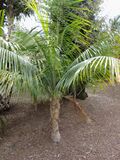 |
Ravenea glauca Jum. & H.Perrier | Vulnerable species | Madagascar. |
| Ravenea hildebrandtii H.Wendl. ex Bouché | Endangered | Comoros. | |
| Ravenea hypoleuca Rakotoarin. & J.Dransf. | Critically endangered | southeast Madagascar | |
| Ravenea julietiae Beentje | Endangered | Madagascar. | |
| Ravenea krociana Beentje | Endangered | Madagascar. | |
| Ravenea lakatra (Jum.) Beentje | Critically endangered | Madagascar. | |
| Ravenea latisecta Jum. | Critically endangered | eastern central Madagascar. | |
| Ravenea louvelii Beentje | Critically endangered | Madagascar | |
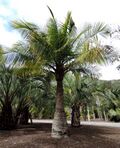 |
Ravenea madagascariensis Becc. | Least concern | Madagascar. |
| Ravenea moorei J.Dransf. & N.W.Uhl | Critically endangered | Comoros. | |
| Ravenea musicalis Beentje | Critically endangered | Madagascar | |
| Ravenea nana Beentje | Endangered | Madagascar | |
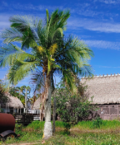 |
Ravenea rivularis Jum. & H.Perrier | Critically endangered | Madagascar |
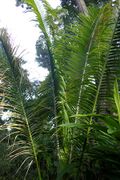 |
Ravenea robustior Jum. & H.Perrier | Near threatened | Madagascar |
| Ravenea sambiranensis Jum. & H.Perrier | Least concern | Madagascar | |
 |
Ravenea xerophila Jum. | Vulnerable species | Madagascar |
Most of the species are endangered. Species such as R. moorei are critically so, with only two specimens known, last seen in 1993 (IUCN report). R. louvelii is little better off, with fewer than 25 plants known (IUCN report). Overall, less than 50 trees of several species are still alive. Historical data indicates that populations are still decreasing for most, except for Ravenea sambiranesis and Ravenea madagascariensis. The species listed as critically endangered will most likely become extinct this century unless measures are taken to cultivate new trees and protect their habitats from being disrupted by deforestation and water pollution. Even if as few as a dozen trees of each species were planted on ideal, protected land where they could reproduce, it would give each species a much better chance for survival.
Cultivation and uses
Ravenea rivularis (majesty palm) is widely cultivated in subtropical regions, and it is sold commercially as a houseplant.[4] It is an adaptable palm that looks somewhat similar to the ever-popular Queen palm. It is a very large palm with a large, untidy crown. It has symmetrical leaves and develops an attractive swollen base of the trunk. Majesty palms prefer full sun, plenty of water, and high humidity to ensure healthy growth. It is tolerant of different soil types. Propagation is by seeds, which germinate in 2–3 months.
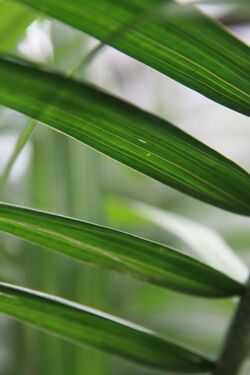
References
- ↑ 1.0 1.1 Kew World Checklist of Selected Plant Families
- ↑ Beentje, H. J. (1994). "A Monograph of Ravenea (Palmae: Ceroxyloideae)". Kew Bulletin 49 (4): 623–671. doi:10.2307/4118064.
- ↑ Govaerts, R. & Dransfield, J. (2005). World Checklist of Palms: 1-223. The Board of Trustees of the Royal Botanic Gardens, Kew.
- ↑ Phillipson, P. (2017). "Ravenea rivularis". IUCN Red List of Threatened Species 2017: e.T38677A67737451. doi:10.2305/IUCN.UK.2017-2.RLTS.T38677A67737451.en. https://www.iucnredlist.org/species/38677/67737451. Retrieved 18 November 2021.
Wikidata ☰ Q144677 entry
 |
